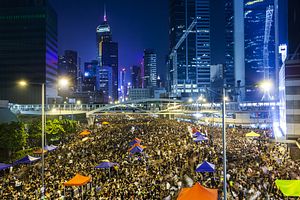On December 15 2014, police cleared Occupy Hong Kong’s last remaining protest sites, putting an end to nearly three months of pro-democracy protests. One day later, Global Times, a popular Chinese newspaper known for its nationalist bent, ran an editorial titled “To guard against color revolution, first oppose peaceful evolution.” (Yào fáng yánsè gémìng, xiān fǎn hépíng yǎnbiàn). It warns that “Hong Kong’s chaos” (xiāng luàn) signals that the threat of Western-orchestrated “color revolutions” (yánsè gémìng) has now reached China. It cautions that China must never permit “Occupy Central” (“Zhàn zhōng”) to morph into “Occupy China” (Zhàn “zhōng”), a clever play on words as the characters for “central” and “China” are the same (中- zhōng). The editorial blames the West, particularly the U.S., for stoking unrest in Hong Kong to further its own interests, and ensure obedience to a US-led cabal composed of “vassal regimes” (fùyōng xìng zhèngquán).
As Hong Kong protests raged in October 2014, state-run media alleged that a high level official at the National Endowment for Democracy (NED) “had met key people from ‘Occupy Central,’ ” months before the Umbrella Revolution got underway. People’s Daily sums up China’s official attitude to the actives of NGOs such as NED, and US democracy and human rights promotion in general. It states that “the U.S. purports to be promoting the ‘universal values’ of ‘democracy,’ ‘freedom’ and ‘human rights,’ but in reality the U.S. is simply defending its own strategic interests and undermining governments it considers to be ‘insubordinate.’ ” Beijing’s fear of a color revolution at home is heightened by the perception that Western interference is a globally destabilizing phenomenon. As Gideon Rachman observes in the Financial Times, “some in Beijing claim to see a sinister pattern of western meddling — stretching from the Arab world to Ukraine, Cuba, Venezuela and now Hong Kong.”
People’s Daily, Global Times, and other party-affiliated media outlets aver that the West uses democracy and human rights promotion as a subversive tactic to inhibit the emergence of a “strong China” (qiángdà de zhōngguó). Central to this narrative is that Western promotion of “universal values” such as democracy and human rights promotion is part of a deliberate strategy of “peaceful evolution” (Hépíng yǎnbiàn). “Peaceful evolution,” as it is understood in the Chinese context, denotes a Western conspiracy to alter the internal societal, cultural and normative composition of socialist states with the objective of precipitating regime change.
Beijing’s fear of peaceful evolution traces its roots back to a strategy championed by U.S. Secretary of State John Foster Dulles in the late 1950s. In a series of speeches, Dulles contended that the U.S. should strive to facilitate peaceful evolution of Communist countries into political systems more in line with those of western democracies. He argued that Washington should utilize “support for nascent forms of opposition within socialist countries, cultural subversion and the spread of information” to effect this outcome. Although, Dulles’s strategy was never fully enacted, at the time it was seized on by Mao Zedong and China’s other leaders. This theory has been episodically resurrected by Chinese media, and has proven useful to the Communist party during periods of heightened political vulnerability, such as the Tiananmen crisis and the Occupy Hong Kong movement. This is because it posits that regime change is doubly threatening to China. According to this narrative, not only will regime change and adoption of democracy not end Western efforts to weaken China, it will contribute to China’s denigration by creating chaos that the US and its allies will exploit.
Linking Hong Kong’s pro-democracy protests to “subversive” Western activity is an easy sell in China because it taps into historically rooted suspicions of Western power and influence. Television programs ceaselessly depict episodes of Chinese resistance during the “Century of Humiliation” (1842-1945), when the Western colonial powers and Japan forced a series of “unequal treaties” (bùpíngděng tiáoyuē) and subjugations on a once-proud civilization. These fraught memories have been reinforced by the post-Tiananmen, government sponsored Patriotic Education Campaign. The campaign, which effectively amounts to official history, is promulgated through textbooks, museum exhibitions, and monuments. It stresses China’s victimization at the hands of the West and Japan, and depicts the Communist party as restoring China to a position of international independence and dignity after 1949. (Needless to say, it glosses over the subsequent tragedies that occurred under the party’s watch.) This historical narrative colors China’s view of its present security situation, as territorial disputes with Japan simmer and many Chinese perceive an intensifying Sino-American rivalry.
It is tempting to write off the exhortations of the Global Times and other Chinese media outlets against perceived Western plots such as “Peaceful Evolution” as just another propaganda tool designed to bolster a regime that faces mounting economic, environmental and social problems. This, however, is only part of the story. Beijing’s obsession with the threat of a color revolution not only reveals suspicion of the West and its values, it also speaks to the fundamental insecurity with which China’s political leadership perceive both their legitimacy to govern and the resiliency of the wobbly political-economic system over which they preside. This has ramifications far beyond China’s domestic politics. As long as these fears animate Beijing’s nightmares, China will remain a cautious participant in Western-led institutions, and deeper cooperation between the West and China on critical international issues such as the global economy and climate change will remain elusive.
John S. Van Oudenaren is a research assistant at the National Defense University’s College of International Security Affairs. The views expressed in this article are those of the author and do not reflect the official policy or position of the National Defense University, the Department of Defense or the U. S. government.

































